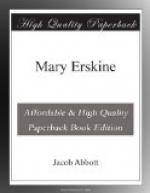[Illustration: MARY BELL AND QUEEN BESS.]
She remained in company with the cows all the afternoon. Sometimes she would wander from them a little way to gather raspberries, and then she would creep up cautiously to Queen Bess, and get another drink of milk. When she had thus had as many raspberries, and as much milk, as she wished, she amused herself for some time in gathering a bouquet of wild flowers to give to Mary Erskine on her return. The time, being thus filled up with useful occupation, passed pleasantly and rapidly along, and at length, when the sun was nearly ready to go down, she heard a distant voice shouting to the cows. It was Thomas, coming to drive them home.
Thomas was of course greatly astonished to find Mary Bell in the woods, and his astonishment was not at all diminished at hearing her story. He offered to carry her, in going home,—but she said that she was not tired, and could walk as well as not. So they went down together, the cows running along before them in the paths. When they reached the house, Thomas went to turn the cows into the yard, while Mary Bell went into the house to Mary Erskine, with her little pail in one hand, and her bouquet of flowers in the other.
CHAPTER VII.
HOUSE-KEEPING.
One of the greatest pleasures which Mary Bell enjoyed, in her visits at Mary Erskine’s at this period, was to assist in the house-keeping. She was particularly pleased with being allowed to help in getting breakfast or tea, and in setting the table.
She rose accordingly very early on the morning after her arrival there from the woods, as described in the last chapter, and put on the working-dress which Mary Erskine had made for her, and which was always kept at the farm. This was not the working-dress which was described in a preceding chapter as the one which Mary Bell used to play in, when out among the stumps. Her playing among the stumps was two or three years before the period which we are now describing. During those two or three years, Mary Bell had wholly outgrown her first working-dress, and her mind had become improved and enlarged, and her tastes matured more rapidly even than her body had grown.
She now no longer took any pleasure in dabbling in the brook, or planting potatoes in the sand,—or in heating sham ovens in stumps and hollow trees. She had begun to like realities. To bake a real cake for breakfast or tea, to set a real table with real cups and saucers, for a real and useful purpose, or to assist Mary Erskine in the care of the children, or in making the morning arrangements in the room, gave her more pleasure than any species of child’s play could possibly do. When she went out now, she liked to be dressed neatly, and take pleasant walks, to see the views or to gather flowers. In a word, though she was still in fact a child, she began to have in some degree the tastes and feelings of a woman.




